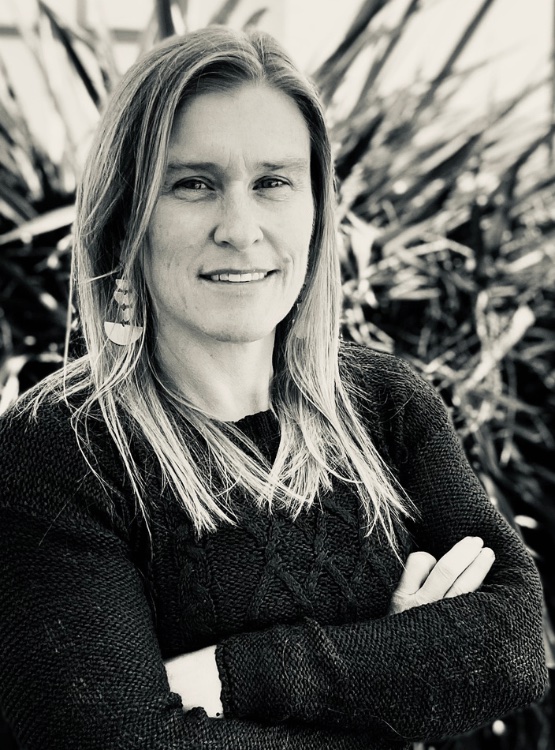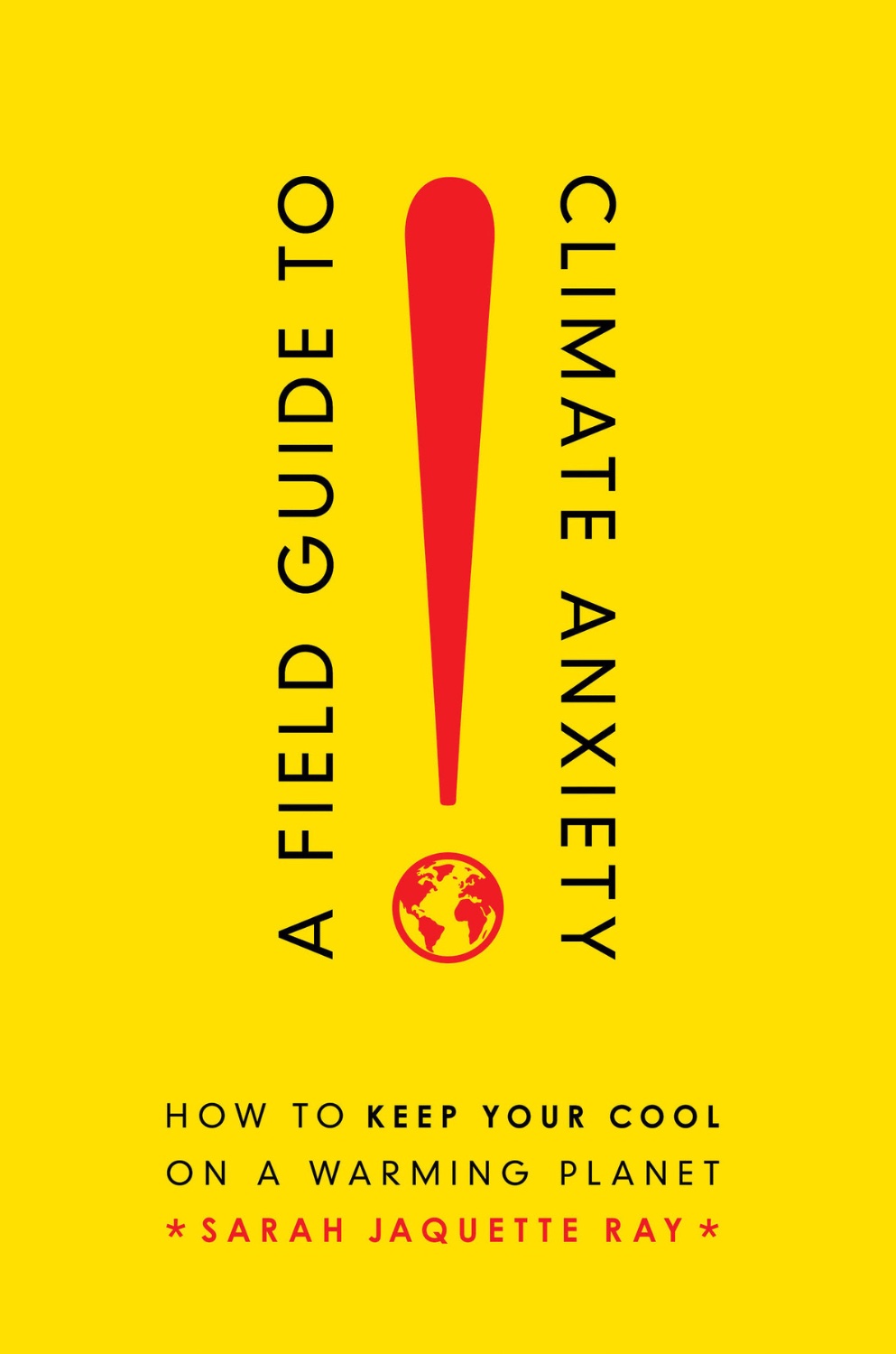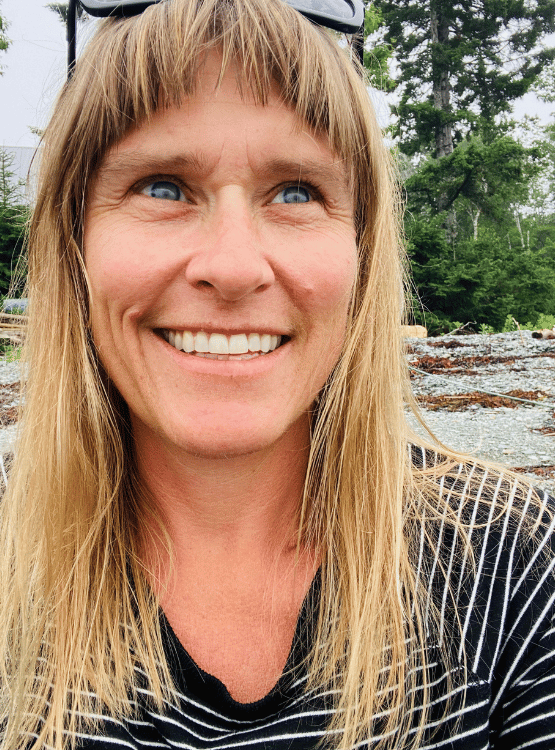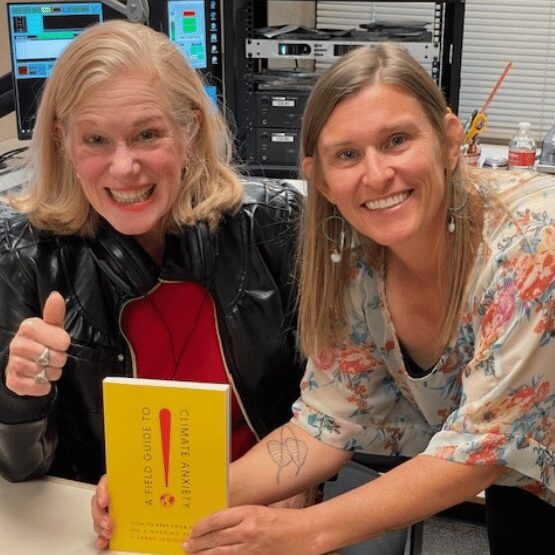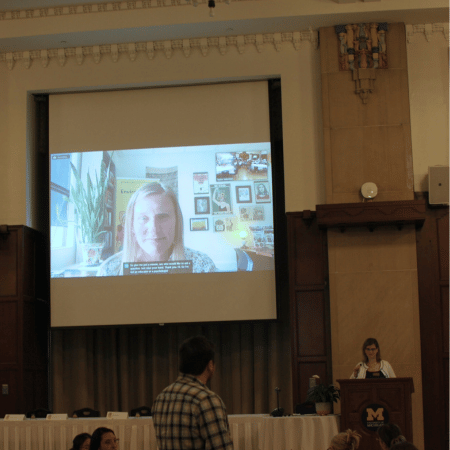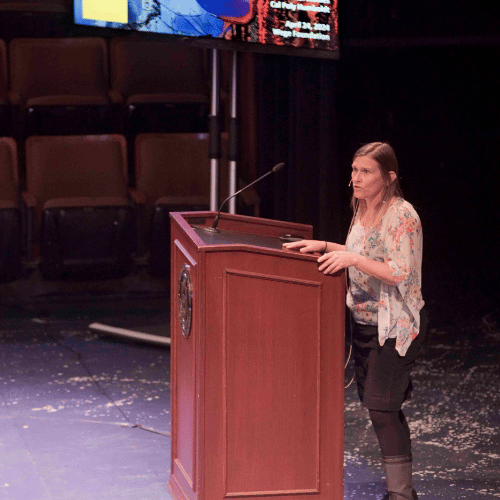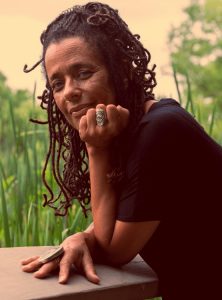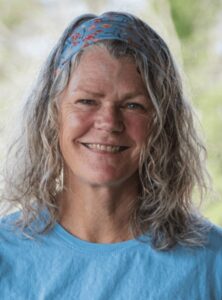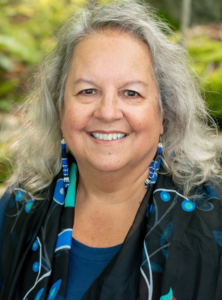 “Dr. Ray was engaging and personable. Staff really enjoyed her presentation and the extended Q&A session. She was able to speak to issues that are important to our staff in a way that allowed for participation from all in the group. People shared that they learned a lot, and appreciated the space to explore these topics.” — Ocean Conservancy, 2024
“Dr. Ray was engaging and personable. Staff really enjoyed her presentation and the extended Q&A session. She was able to speak to issues that are important to our staff in a way that allowed for participation from all in the group. People shared that they learned a lot, and appreciated the space to explore these topics.” — Ocean Conservancy, 2024
 “We were thrilled to have Dr. Sarah Jaquette Ray share her invaluable insights with our company. Her presentation, based on her book A Field Guide to Climate Anxiety, expertly explored the link between effective climate action and maintaining healthy emotions. We received numerous messages from attendees saying they loved the speaker and the event. We highly recommend Dr. Ray as a speaker for any event addressing climate change, emotional resilience, social justice, or the intersection of these topics.” — Qualtrics, 2024
“We were thrilled to have Dr. Sarah Jaquette Ray share her invaluable insights with our company. Her presentation, based on her book A Field Guide to Climate Anxiety, expertly explored the link between effective climate action and maintaining healthy emotions. We received numerous messages from attendees saying they loved the speaker and the event. We highly recommend Dr. Ray as a speaker for any event addressing climate change, emotional resilience, social justice, or the intersection of these topics.” — Qualtrics, 2024
 “Dr. Sarah Jaquette Ray inspired event attendees with her informative and enlightening keynote address. . . She was charismatic and compelling, despite presenting over Zoom, and had clearly tailored her talk to provide as much helpful content and background as possible, building on her books, and addressing the specific topics we had asked her to focus on. She was also very thoughtful in her responses during the Q&A portion, and closely engaged with us. She was an inspiration!” — University of Michigan, 2024
“Dr. Sarah Jaquette Ray inspired event attendees with her informative and enlightening keynote address. . . She was charismatic and compelling, despite presenting over Zoom, and had clearly tailored her talk to provide as much helpful content and background as possible, building on her books, and addressing the specific topics we had asked her to focus on. She was also very thoughtful in her responses during the Q&A portion, and closely engaged with us. She was an inspiration!” — University of Michigan, 2024
 “She was exceptional with our high school students, highly engaging, and generated great enthusiasm and questions. Her intellect, experience, engaging personality and enthusiasm made for a great experience for all our guests and staff. Thank you!” — The Wege Foundation, 2024
“She was exceptional with our high school students, highly engaging, and generated great enthusiasm and questions. Her intellect, experience, engaging personality and enthusiasm made for a great experience for all our guests and staff. Thank you!” — The Wege Foundation, 2024
 “The book is carefully and clearly written, demonstrating the author’s commitment to climate work and to engaging with students, as well as the depth of her own knowledge as an environmentalist. Highly recommended.” — CHOICE
“The book is carefully and clearly written, demonstrating the author’s commitment to climate work and to engaging with students, as well as the depth of her own knowledge as an environmentalist. Highly recommended.” — CHOICE
 “Not surprisingly . . . this small book reads like the distillation of simple folk wisdom.” — Geography Realm
“Not surprisingly . . . this small book reads like the distillation of simple folk wisdom.” — Geography Realm
 “This book makes an overdue and very welcome contribution to the world, where the mental health impacts and cascading losses that climate change generates are increasing rapidly. It synthesises a range of psychological theory, personal experience, Buddhist philosophy and activist self-care wisdom. This is organised into a series of strategies that can help people of any age to play the long game of fighting for climate justice.” — Australian Journal of Environmental Education
“This book makes an overdue and very welcome contribution to the world, where the mental health impacts and cascading losses that climate change generates are increasing rapidly. It synthesises a range of psychological theory, personal experience, Buddhist philosophy and activist self-care wisdom. This is organised into a series of strategies that can help people of any age to play the long game of fighting for climate justice.” — Australian Journal of Environmental Education
 “It would be foolish not to freak out over climate change. But it would be sad if that despair kept you from working hard on this crisis, not to mention enjoying life on what is still a beautiful planet. This book has some wise strategies for finding a useful balance.” — Bill McKibben, author of Falter: Has the Human Game Begun to Play Itself Out?
“It would be foolish not to freak out over climate change. But it would be sad if that despair kept you from working hard on this crisis, not to mention enjoying life on what is still a beautiful planet. This book has some wise strategies for finding a useful balance.” — Bill McKibben, author of Falter: Has the Human Game Begun to Play Itself Out?
 “Ever laid awake at night gripped with panic about the future? Ever wondered how to make sense of your path in light of the forecasted climate futures? Bold and beautiful, this hands-on companion is essential reading for wrestling with the most important issue of our time.” — Kari Marie Norgaard, author of Living in Denial: Climate Change, Emotions, and Everyday Life
“Ever laid awake at night gripped with panic about the future? Ever wondered how to make sense of your path in light of the forecasted climate futures? Bold and beautiful, this hands-on companion is essential reading for wrestling with the most important issue of our time.” — Kari Marie Norgaard, author of Living in Denial: Climate Change, Emotions, and Everyday Life
 “Written for the Gen Z ‘climate generation,’ this book is essential reading for anyone despairing over our current climate emergency and future of turbulent change. Ray’s strategies offer deep and practical ways to cultivate collective resilience and creative adaptation, and even thrive in a climate-changed world.” — Leslie Davenport, author of Emotional Resiliency in the Era of Climate Change
“Written for the Gen Z ‘climate generation,’ this book is essential reading for anyone despairing over our current climate emergency and future of turbulent change. Ray’s strategies offer deep and practical ways to cultivate collective resilience and creative adaptation, and even thrive in a climate-changed world.” — Leslie Davenport, author of Emotional Resiliency in the Era of Climate Change
 “A short but heartfelt note to say *thank you* so much for visiting us yesterday. It was an absolute treat for me, your words and wisdoms resonated with (and provoked in a good way) the students, and you set a framework for learning and experimentation that I’m grateful to have had so early in the semester, that I know will be a key touchstone in the weeks ahead. Thank you!” — Professor, USC 2023
“A short but heartfelt note to say *thank you* so much for visiting us yesterday. It was an absolute treat for me, your words and wisdoms resonated with (and provoked in a good way) the students, and you set a framework for learning and experimentation that I’m grateful to have had so early in the semester, that I know will be a key touchstone in the weeks ahead. Thank you!” — Professor, USC 2023
 “We recently read your book A Field Guide to Climate Anxiety, and I found it to be such a wonderful source of inspiration, insight, and motivation. Thank you for your powerful, empowering message! I feel strongly that my peers need to hear your message as well.” — Student, Centre College, 2021
“We recently read your book A Field Guide to Climate Anxiety, and I found it to be such a wonderful source of inspiration, insight, and motivation. Thank you for your powerful, empowering message! I feel strongly that my peers need to hear your message as well.” — Student, Centre College, 2021
 “In reading your book, A Field Guide to Climate Anxiety: How to Keep Your Cool on a Warming Planet, I identified closely with the worries and climate anxiety you talked about regarding late millennials and gen-Z. I also found the tools you talked about for taking action and cultivating resilience, such as emotional intelligence, working within your spheres of influence, overcoming barriers to climate inaction, and taking a social justice approach to be extremely helpful for me to make changes in mindset and seek out new ways to make a difference. I think that many students are looking for ways to take action on environmental, social justice, and other issues but don’t really know how to and could benefit greatly from your ideas and expertise.” — Student, Centre College 2021
“In reading your book, A Field Guide to Climate Anxiety: How to Keep Your Cool on a Warming Planet, I identified closely with the worries and climate anxiety you talked about regarding late millennials and gen-Z. I also found the tools you talked about for taking action and cultivating resilience, such as emotional intelligence, working within your spheres of influence, overcoming barriers to climate inaction, and taking a social justice approach to be extremely helpful for me to make changes in mindset and seek out new ways to make a difference. I think that many students are looking for ways to take action on environmental, social justice, and other issues but don’t really know how to and could benefit greatly from your ideas and expertise.” — Student, Centre College 2021
 “Our students will long remember your interest in their experiences and your candor about the difficulty of their questions. After our meeting, an environmental studies student remarked that she felt like you had given her a basis for hope – something she said that she feels but didn’t know how to justify. What a gift for her, for us.” — Manchester University, 2023
“Our students will long remember your interest in their experiences and your candor about the difficulty of their questions. After our meeting, an environmental studies student remarked that she felt like you had given her a basis for hope – something she said that she feels but didn’t know how to justify. What a gift for her, for us.” — Manchester University, 2023
